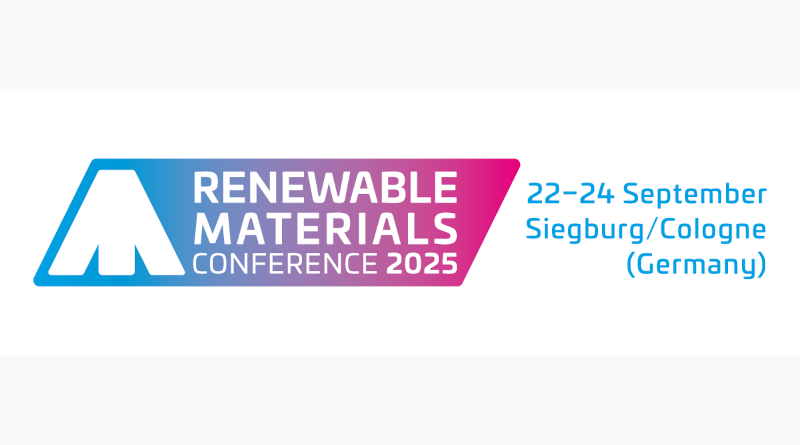“Renewable Materials Conference 2025” to be held September 22 – 24 in Siegburg, Germany
The Renewable Materials Conference (RMC) 2025, the world’s leading event on the renewable carbon economy, will take place from 22–24 September 2025 in Siegburg/Cologne, Germany. Organised by the nova-Institute, the conference will serve as a platform for showcasing strategies and innovations aimed at replacing fossil carbon in the chemicals and plastics industries with renewable alternatives such as biomass, carbon capture and utilisation (CCU), and recycling.
With more than 500 participants expected – following a strong turnout of nearly 500 from 32 countries in 2024 – RMC continues to grow in importance. Approximately 90% of attendees come from the industrial sector, underlining the conference’s significance for business leaders, technology developers, investors and policy makers. This year’s programme includes 75 presentations, 20 panel discussions, and up to 12 workshops, covering a wide range of topics across the renewable materials value chain.
One of the key highlights of RMC 2025 will be the “Renewable Material of the Year 2025” Innovation Award, where six selected nominees will present their innovations, with the winner chosen by the audience.
RMC 2025 will explore five major thematic pillars, reflecting the urgent need for defossilisation and a transition toward a circular, renewable carbon economy.
1. Defossilisation of the chemical industry
Currently, over 90% of the carbon embedded in chemicals and plastics originates from fossil sources. The transition to biogenic, captured and recycled carbon is seen as one of the most critical steps in climate change mitigation. In 14 presentations, chemical companies, start-ups and industry associations will present solutions including alternative feedstocks, electric crackers, non-cracker production via methanol and ethanol, biotechnology, and lignocellulosic biorefineries.
2. Fine chemicals
The fine chemicals sector – valued at around US$180 billion – is witnessing a surge in bio-based innovation. In six presentations, companies will share progress in biocatalysis, biotechnology, and the development of sustainable, high-purity compounds used in pharmaceuticals, cosmetics, and food additives, highlighting opportunities for decarbonising this high-value segment.
3. Fossil-free plastics
With 95% of global plastics still derived from fossil carbon, there is increasing pressure to scale sustainable alternatives. RMC will feature 22 presentations on new materials made from biomass, CO₂ and recycled feedstocks, addressing applications in packaging, consumer goods, automotive, textiles, and high-performance sectors. This track includes the presentations from the six finalists for the Renewable Material of the Year award.
4. Setting the frame for renewable carbon
As policies such as the European Green Deal and the sustainable carbon cycles framework gain traction, the conference will explore the political and economic enablers needed for industry-wide transformation. Eleven presentations, panel discussions, and workshops will focus on regulation, investment, and innovation policy.
5. Biodegradation
Biodegradable plastics remain a complex issue. RMC will feature 11 presentations and a dedicated workshop examining the latest scientific insights, policy developments – such as the Packaging and Packaging Waste Regulation (PPWR) – and the appropriate applications for biodegradability.

